- Home
- Pat Conroy
Beach Music Page 4
Beach Music Read online
Page 4
Leah and I were minor celebrities when we walked out of Regina Coeli. The short time in prison had improved my skills in Italian immeasurably and I suggested a stay in jail as a surefire way to master the language for any American who was serious about being bilingual in a short amount of time.
But the most durable result of our incarceration was the status and visibility it granted us as citizens of the piazza. Many of the older men who sat on the bench in front of the palazzo thought that much of the greatness of Italy depended on the firmness with which its men handled its women. In a Mediterranean country, especially in the south of Italy and among certain members of the lower classes, wife-beating is a form of family discipline, like the breaking of mules to work in the fields, and certainly not the business of American tourists. But the women of the piazza were unanimous in their contempt for Mimmo and in their boundless admiration for anyone who would shed his blood and spend time in prison in the defense of Italian women.
So it was the whole piazza that watched as the stranger followed us out of the piazza this morning and down the Via di Monserrato.
Leah was wearing a yellow smock and polished brown leather shoes and she studied her image in every window she passed. She felt pretty and her dark hair flashed like a wing in sunlight. Giancarlo, the forty-year-old brain-damaged cripple, called out to us as his exhausted, long-suffering mother wheeled him past the English seminary. No one in the neighborhood knew what would happen to Giancarlo once his mother died, and it was always a relief when they appeared in the streets each morning. The deaf-mute, Antonio, waved to us, and I paused to light one of his cigarettes. English seminarians surrounded us on their way to classes, serious boys who rarely smiled and had an odd pallor as though raised deep inside caves.
“Do you think that man wants to kill us, Daddy?” Leah asked.
“No, I think he just wants to know where we live and what we do and where you go to school.”
“He already knows that. He followed us on Friday.”
“It’s nothing to worry about, darling,” I said, squeezing my daughter’s hand. “He’s not going to ruin our walk to school.”
At 20 Via di Monserrato we stepped into a courtyard of deep, spicy shade and Leah called into the courtyard for the cat, Gerardo, to come out of the garden to receive his morning slice of pepperoni. The cat came to her on the run with tawny movements of leaf and silk. He accepted the meat greedily from Leah, then took it up the formal stairway inlaid with fragments of marble tablets and partially effaced statuary. The man following us was pretending to read the menu in the trattoria in the small piazza.
“If he eats there, I hope he orders mussels,” Leah said.
“Shame on you,” I said; an American tourist had just gotten hepatitis after eating mussels at another Roman restaurant.
“I bet he’s with the Red Brigades,” she said.
“How do you know about the Red Brigades?”
“Maria tells me everything. They killed the Italian Prime Minister and dumped him in the trunk of a car. I’ll show you where they left him if you want.”
“He’s not with the Red Brigades. He dresses too well.”
“You should dress better. Like an Italian,” Leah said.
“I apologize for lacking bella figura, you little turd,” I said affectionately.
“That’s another thousand lire you owe me,” she said. “It’s not nice to call your own daughter a little turd.”
“It’s a term of endearment. Another way of saying ‘I love you.’ All dads in the States say that.”
“It’s gross. No Italian father would ever say that to his daughter. They love their daughters far too much.”
“Is that what Maria says?”
“And Suor Rosaria.”
“You’re absolutely right. From this moment on, I’m going to concentrate and get me some of that bella figura.”
We weaved our way carefully through the morning traffic, for I knew that a Roman never just drives—he aims—and I am always extraordinarily vigilant when we walk to and from school. Once we had seen an English tourist on the Ponte Mazzini throw up his hands in mock surrender and simply stop his car in the middle of the bridge. When I went to see if I could help, the Englishman said, “This isn’t driving. I say it’s rugby.”
“It’s going to be a beautiful day, Daddy,” Leah said. “No pollution.” On some days the pollution level was so high that the Hilton was invisible, and I felt comforted that smog could actually perform a public service.
“St. Peter’s head,” she said as soon as the dome of St. Peter’s came into view above the plane trees along the river. She had confused the words “head” and “dome” when we first had moved to Rome and it was an old joke between us. I looked down at the curve in the Tiber. No river, no matter how polluted or dirty, could quite pull off the trick of being ugly. Few things rivet me like the beauty of moving water.
The man kept his distance and did not even mount the bridge until he saw us walk down the stairs beside the Regina Coeli prison. He was being more cautious now that he knew we were aware he was following us. Perhaps people in the piazza had told him about my throwing Mimmo into the pinball machine.
We entered the courtyard of Sacra Cuore at the end of the long street, the Via di San Francesco di Sales.
Suor Rosaria, a slight but beautiful nun who had a reputation as one of the best teachers of young children in Rome, saw us approaching. For three years, she had taught Leah and the communication between them was immediate and total. The nuns I had known in South Carolina were rancorous creatures and they had helped poison my odd and tortured Catholic boyhood. Although I knew that it was as impossible to be an ex-Catholic as it was to be an ex-Oriental, I vowed I would never raise Leah as a Catholic. What I had not anticipated was that by living in a Catholic country she would be unable to avoid the Church’s magisterial reach.
Suor Rosaria swooped out of the schoolhouse doorway and ran toward Leah, who saw her coming, and they rushed into each other’s arms like schoolgirls. I was thrilled by the authenticity of this nun’s open and complete love for Leah. Suor Rosaria looked at me with bright flirtatious eyes and said she was glad that we were bringing their guest to school again. With her eyes she made a movement toward the man who had followed us through Rome for the fourth day in a row.
“Chi è?” Suor Rosaria asked.
“He’ll let me know,” I answered in Italian. “He wants us to know we’re being followed. Maybe today he’ll let me know why.”
“Do you know, Signor McCall,” Suor Rosaria said, “that you have the smartest, most beautiful little girl in the city of Rome?”
“Sì, Suora,” I answered. “I’m the luckiest man in the world.”
“You’re the nicest daddy in the world,” Leah said, hugging me.
“Now that’s how you can earn some real money, tiger. Keeping me from cussing’s just small potatoes.”
“Be careful of that man,” Leah said. “If you die, Daddy, I’ll be all alone.”
“Nothing’s going to happen. I promise.” I said good-bye and passed out of the convent grounds, taking a quick survey of the street. Young ballerinas were making their way in those floating ethereal walks of dancers to the studio in the middle of the Via di Francesco di Sales and young art students were slouching and smoking on the art school steps. But there was no trace of the follower. I waited for a full minute, then saw a quick movement of a man’s head appear in the doorway of a bar across from the ballet school and just as quickly disappear.
I had put on my running shoes that morning and I broke into a slow trot along one of those straight, comely Roman streets with high walls and no exits, and approached the café.
As I entered, the man gestured to me to join him at the bar.
“I’ve already ordered you a cappuccino, Signor McCall,” he said pleasantly.
“You’ve been scaring my daughter, Sherlock. I want it to stop.”
“You take one sugar in your cappuccino, I
believe,” the man said. “I think I know your habits.”
“Do you know of my tendency to kick ass when I get nervous?”
“Your propensity for violence has been described to me often. But I am a veteran of many self-defense courses. Tai kwon do, jujitsu, karate. I’ve many black belts in my closet. I’ve been trained by masters to run from danger.
“But now let us have our coffee, no?” the man continued. “Then we will get up to business.”
“I didn’t know they had private eyes in Italy,” I said as the bartender passed me a cup of cappuccino across the counter.
The man tested his coffee by sipping a spoonful of it and nodding his head appreciatively.
“We are like priests. People only come to us when they are in trouble. My name is Pericle Starraci. I have an office in Milano. But I like to travel around Italy because of my interest in Etruscan art.”
“Why are you following me, Pericle?”
“Because I was paid to do so.”
“Back to square one. Who sent you?”
“She would like to arrange a meeting with you.”
“Who is it?”
“She wants to sign a peace treaty.”
“My mother. My goddamn untrustworthy, back-stabbing, pain-in-the-ass mother.”
“It’s not your mother,” Pericle said.
“Then it’s my father-in-law.”
“No,” Pericle said. “It is his daughter.”
“Martha,” I said, surprised. “Why in the hell would Martha hire you?”
“Because no one would give her your address. Your family would not cooperate with her.”
“Good,” I said. “That’s the first nice thing I’ve heard about my family in years.”
“She needs to talk to you.”
“Tell her I wouldn’t see her or any member of her family if God himself typed me out a note on his personal computer. Surely she’s told you that.”
“She told me there was a great misunderstanding that she thinks can be cleared up.”
“There’s no misunderstanding,” I said, getting ready to leave. “I made a vow never to see those people again. It’s the easiest promise to keep I’ve ever made. The second easiest was the promise never to see any of my own family again. I’m very democratic. I don’t want to see a fucking soul who ever spoke English to me during my first thirty years on earth.”
“Signora Fox understands now that you were not responsible for her sister’s death.”
“Tell her thanks and that I don’t hold her responsible for the depletion of the ozone level or the melting of the polar icecap or the rising price of pepperoni. Nice talking to you, Pericle.”
I stood up and walked out into the street.
“She has some information,” Pericle said, struggling to keep up. “Something she says you will want to know. It is news of some woman. A woman of coins, I think she calls it.”
I stopped when he spoke those words: They went through me like shrapnel.
“Tell Martha I’ll meet her tonight for dinner. I’ll be at Da Fortunato’s, near the Pantheon.”
“I already have, Signor McCall,” Pericle said smoothly. “See. I told you. I know all your habits.”
Chapter Two
When friends come to Rome in early summer to visit me I like to take them to the Pantheon during thunderstorms and stand them beneath the opening of the feathery, perfectly proportioned dome as rain falls through the open roof against the marble floor and lightning scissors through the wild and roiled skies. The emperor Hadrian rebuilt the temple to honor gods no longer worshiped, but you can feel the brute passion in that ardor in the Pantheon’s grand and harmonious shape. I think gods have rarely been worshiped so well.
On my first trip to Rome, I spent a whole day studying the interior and exterior architecture of the Pantheon for an article I was writing for Southern Living. When the guard ran me out an hour before sunset, I looked around the neighborhood for a good restaurant for dinner that night. Shyla walked from our hotel to join me after spending the day shopping on the Via Condotti. She had bought herself a scarf and a pair of shoes from Ferragamo, for her small, beautiful feet, which were her special vanity. Suddenly, on the Via del Pantheon, the air filled with a strange musky underground perfume that neither of us recognized. Like two bird dogs, we set out on the trail of the scent and found its origin by the entranceway of Da Fortunato. A basket of white truffles exuded the biting, exotic smell that seemed a transubstantiation of some essence of the forest to the garlic-scented, wine-splashed airstreams pillowing through the alley outside the trattoria.
We returned that evening after making love in our hotel room. Afterward, we had held each other tightly, still surprised and shy by how high we could turn up the flame of that tender need we showed for each other’s bodies. At certain times in our lives, we crackled in the sheer electricity of our desire to be wonderful in bed. In strange cities, alone, we whispered things we would not tell another soul on earth. We set down feasts for each other and treated our love with tongues of fire. Our bodies were fields of wonder to us.
The waiter, Fernando, but nicknamed Freddie, served us dinner that night. He was heavy-set and deep-voiced and in perfect command of his quadrant of the restaurant. He led us to the small table outside looking out toward the Pantheon, and recommended a bottle of Barolo and a risotto for the pasta course. When he brought the risotto, he produced an elegant, razor-sharp instrument and shaved thin slices of white truffle onto the steaming hot risotto. The marriage of rice and truffle exploded in silent concordat and I shall never forget lifting the bowl to my nose and thanking God for bringing both Freddie and truffles into our life the same night.
The dinner was long and we took our time. We talked about the past and the many things that had gone wrong between us. But quickly we turned to the future and began to talk about children and what we would name them and where we would settle down and how we would raise these ethereal and beautiful McCall children who, though unborn, were already greatly beloved.
Shyla flirted with Freddie every time he came to the table and Freddie responded with a touch of both restraint and Mediterranean charm. He recommended the fresh scampi, grilled briefly, then anointed with olive oil and lemon juice. The olive oil was a deep green and looked as though it had come from a vineyard of emeralds. The scampi tasted sweet like a lobster fed only on honey and it cut into the deep undertone of flavor deposited on the taste buds by the truffles. Shyla poured some olive oil on her fingers and licked it off. Then she poured some on my fingers and sucked the oil off them one at a time as Freddie watched with envy and approval. He honored her performance with an arugula salad, then pulled out a pocketknife, opened it, and began to undress a blood-red orange from Sicily in a patient, sacramental ceremony. The orange peel curled off the deep ruby of the fruit in a long, circular ribbon. I waited for Freddie to misjudge, but he continued to circumnavigate the orange until other patrons began to applaud. When the peel, as long as a garter snake, fell to the floor, Freddie picked it up and presented it to Shyla, who inhaled the sharp smell as Freddie divided the orange and set it before her in an immaculate arrangement, pretty as a rose. He brought glasses impressed with the image of the Pantheon and poured us both a glass of grappa.
A full moon hung over the city, and a Gypsy girl selling long-stemmed flowers moved nimbly through the diners. Three men from Abruzzi sang Neapolitan love songs, then passed the hat for tips, and a fire-eater swallowed his flaming sword and a man with a ukulele sang “I Want to Hold Your Hand” and “Love Me Tender.”
“This is just like a Fellini movie, Jack,” Shyla said. “Let’s never leave this spot.”
Crowds of Italian teenagers, insouciant and callow, moved through the streets into the Piazza della Rotonda in ceaseless migrations. Gypsy women appeared in brilliant, gaudy clothing, raucous as parrots, and began working the loungers at the café as waiters tried to intercept them. Carriages drawn by retired racehorses put out into the streets and ro
lled through the crowds bearing German and Japanese tourists, who were filming everything and seeing nothing.
At the end of the evening, Freddie brought two cups of espresso to the table and asked us always to remember Da Fortunato and the headwaiter, Freddie, who’d been privileged to serve us on a Roman night that he called “fantastica.” Shyla kissed Freddie in a spontaneous gesture that seemed just right.
As I was studying the bill, Shyla pressed my hand and told me to look up.
What I saw was Freddie leading Federico Fellini and two of the most stunning women I had ever seen to the table next to us. Freddie winked and said, “Always at Da Fortunato.” Then Freddie, who understood the power of gesture, bought a rose from a Gypsy girl and presented it to Shyla along with a wineglass from Da Fortunato.
After Shyla died, I found that glass and that dead rose and the orange peel carefully wrapped and preserved in her safety deposit box. They reminded me that there are nights on earth when a couple can have everything break perfectly for them, nights when the moon is full and Gypsies appear with flowers, and truffles call out to strangers on the street and Fellini takes the next table and Freddie peels a blood-red orange as an act of homage, and on that night in Rome we were in love as no one on earth has any right to hope to be, we conceived our child, Leah, in a union of ineffable and damaged love and a great soaring cry of yes for our future.
Two and a half years later, Shyla went up on the bridge.
On this evening, many years later, Freddie embraced me when I walked into the restaurant and kissed me on both cheeks, European-style.
“Dov’ è Leah?” Freddie asked.
“She’s at home with Maria.”
“A beautiful signorina is waiting at your table.”
Martha stood up as I approached her. She extended her hand and I accepted it reluctantly. She did not try to kiss me, nor would I have let her.
“It’s nice of you to come, Jack,” Martha Fox said.

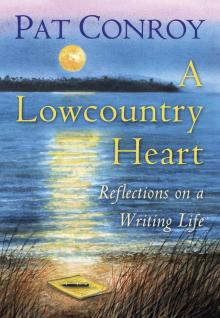 A Lowcountry Heart: Reflections on a Writing Life
A Lowcountry Heart: Reflections on a Writing Life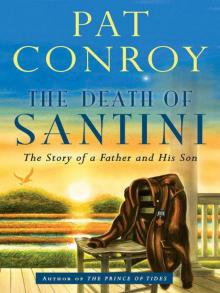 The Death of Santini: The Story of a Father and His Son
The Death of Santini: The Story of a Father and His Son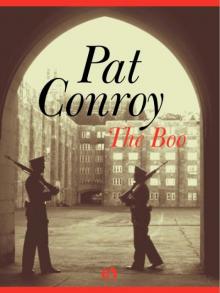 The Boo
The Boo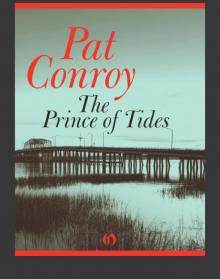 The Prince of Tides
The Prince of Tides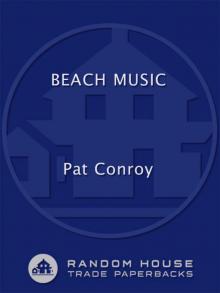 Beach Music
Beach Music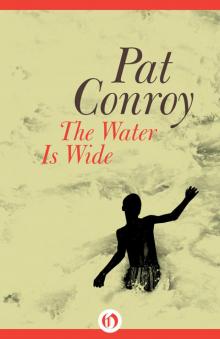 The Water Is Wide
The Water Is Wide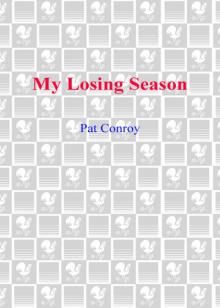 My Losing Season
My Losing Season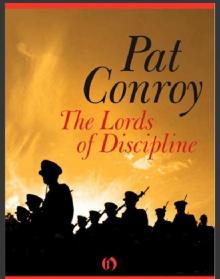 The Lords of Discipline
The Lords of Discipline Pat Conroy Cookbook
Pat Conroy Cookbook My Reading Life
My Reading Life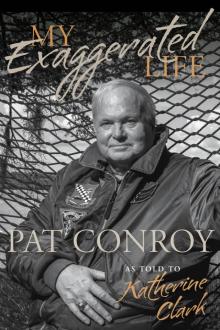 My Exaggerated Life
My Exaggerated Life The Pat Conroy Cookbook
The Pat Conroy Cookbook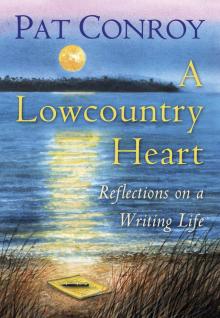 A Lowcountry Heart
A Lowcountry Heart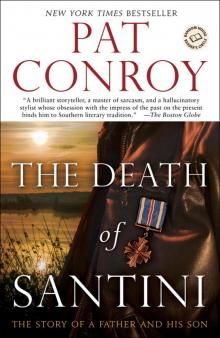 The Death of Santini
The Death of Santini